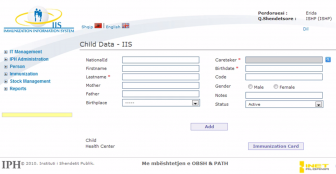Oct 2, 2014
ABCE policy reports for Kenya, Uganda, and Zambia highlight progress and challenges in delivering health services
Policies, Practices, Products, Stock Management
Global
Nov 6, 2014
The Health of the People – What works, the African Regional Health Report 2014
Policies, Practices, WHO
Global
Oct 10, 2014
Toolkit: Bridging the Gap between Ministries of Health and Ministries of Finance
In many countries, Ministries of Health (MOHs) and Ministries of Finance (MOFs) determine which health services are delivered, when, where, and for whom. MOHs are responsible for setting national health policy and managing the day-to-day delivery of public health services, but they are dependent upon MOFs for establishing funding levels and releasing the necessary funds to finance MOH operations. Designed for health sector managers, the new Toolkit for Ministries of Health to Work More Effectively With Ministries of Finance, presents four different tools to help MOH staff better manage their resources and communicate more effectively with their MOF counterparts.
Oct 28, 2014
BLN Webinar: Web-based Immunization Information Systems
eHealth, Immunization Registry, Software, Training
Albania
The Better Immunization Data Initiative Learning Network (BLN) recently hosted a webinar which elaborated on the establishment, use, and added value of a web-based Immunization Information System (IIS) in Albania.The talk covered the process of establishing the registry-based system, the opportunities it affords, and the challenges and constraints associated with the system.
Jun 6, 2014
Patient De-Identification Handbook
eHealth, eHealth architecture, Patient De-Identification, Policies
Global
Sep 10, 2014
Q&A with the BID Learning Network Director: Part 2
Peer Learning, Policies, Practices, Products
Tanzania, Zambia, Q&A with the BID Learning Network Director: Part 2
We recently sat down with Chilunga Puta to learn more about her new role as the BID Learning Network (BLN) director. In the second part of her Q&A, Chilunga shares more details about the BLN and why it’s important to BID’s overall success.
Aug 1, 2014
Understanding the needs and wants of Community Healthcare Workers
mHealth, Peer Learning, Software, Telecommunications, Tools, Training
South Africa
This work builds on the recently published End Consumer Primary Research and aims to inform health and mobile stakeholders about the users of mHealth services in the public sector. The GSMA expects this market knowledge to lead to product design that is more aligned to the needs of users (consumers and health workers), greater adoption and achievement of economies of scale and sustainability, and robust partnershipsbetween public and private sector stakeholders that ultimately reduce the widespread fragmentation of mHealth services in South Africa.
Aug 21, 2014
Q&A with the BID Learning Network Director: Part 1
Peer Learning, Policies, Practices, Products
Tanzania, Zambia
As the BID Initiative rapidly expands its team to gear up for country implementation, we welcome Chilunga Puta who will serve as director of the BLN, based in Zambia. We recently sat down with Chilunga to learn more about her role and what she looks forward to as she steps into this critical position. Stay tuned for part two of her Q&A series where Chilunga will share her thoughts and insight around the importance of peer learning and how the BLN is critical to success.
Feb 12, 2014
Effectiveness Assessment Tool for High-Performance Social Change Organizations: An Overview
This overview provides an introduction to the Effectiveness Assessment Tool for High Performance Social Change Organizations. The tool is used to analyze the degree to which an agency has aligned their formal and informal operating environment with change as mission critical in order to identify ways to maximize agency effectiveness. The tool is particularly relevant to individuals and organizations seeking to build evaluation capacity, enhance evaluation use, foster organizational learning and pursue organizational change.Jul 2, 2014
The Use of mHealth for Material Health Care in Ethiopia
mHealth, Peer Learning, Software, WHO
Ethiopia
"For the research in this thesis, we mainly followed a phase‐by‐phase evaluation and user‐centered approach. Cross‐sectional surveys were initially conducted to assess the role of HEWs and identify gaps in improving maternal health care service delivery. Then, considering mobile technologies as a potential solution for improving the performance of the health workers, we developed and evaluated a set of appropriate smartphone mHealth applications using open source components, including a local language adapted data collection tool, health worker and manager user‐friendly dashboard analytics and maternal‐newborn electronic forms/protocols. This thesis includes the technical details of the application and electronic protocols."
Jump in. Expand your knowledge.
Events
No upcoming events.
